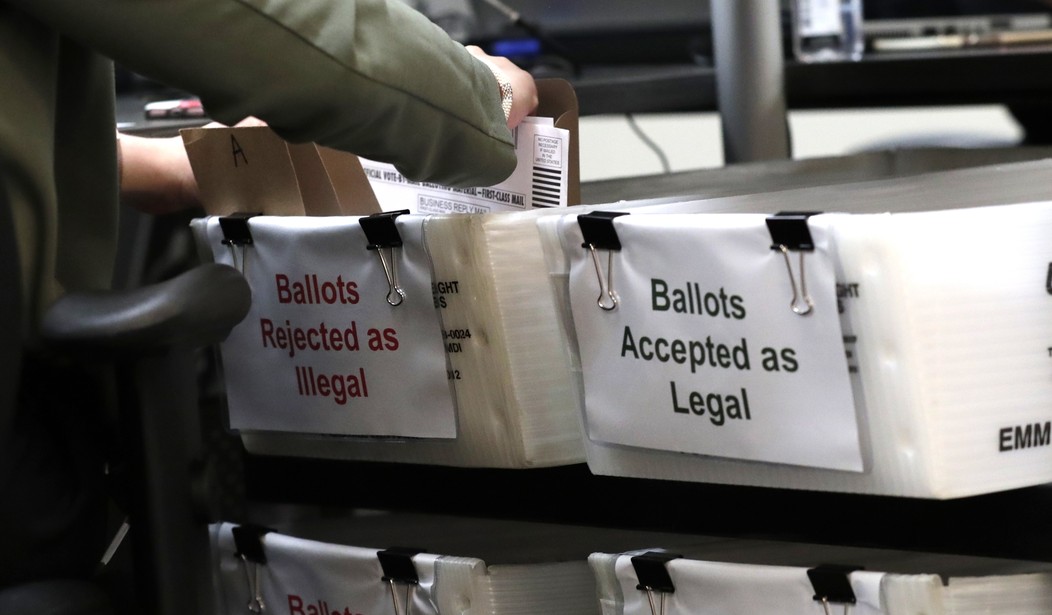Ten days ago, on June 15, after watching a video of Attorney General Merrick Garland giving a speech to the Civil Rights Division of the Justice Department I wrote the following:
Garland’s speech announced that DOJ would take up a “rear guard” action to protect Democrat-supported election rigging schemes from being rolled back by state legislatures.
Garland made it clear it would be the mission of the Biden Justice Department to put a stop to all that.
The Civil Rights Division made good on Garland’s pledge today by filing a lawsuit against the State of Georgia seeking to block implementation of many of the ballot integrity measures passed by into law by the Georgia legislature in Georgia Senate Bill 202.
In the accompanying press release, DOJ announced that it was targeting the following items provided for in Georgia’s new statute:
The United States’ complaint challenges several provisions of Senate Bill 202, including a provision banning government entities from distributing unsolicited absentee ballot applications; the imposition of costly and onerous fines on civic organizations, churches and advocacy groups that distribute follow-up absentee ballot applications; the shortening of the deadline to request absentee ballots to 11 days before Election Day; the requirement that voters who do not have identification issued by the Georgia Department of Driver Services photocopy another form of identification in order to request an absentee ballot without allowing for use of the last four digits of a social security number for such applications; significant limitations on counties’ use of absentee ballot drop boxes; the prohibition on efforts by churches and civic groups to provide food or water to persons waiting in long lines to vote; and the prohibition on counting out-of-precinct provisional ballots cast before 5 p.m. on Election Day. The complaint asks the court to prohibit Georgia from enforcing these requirements.
Most of these are election procedures that were adopted in Georgia and elsewhere to increase mail-in voting during the pandemic when it was thought that traditional in-person voting at a precinct location represented an unreasonable risk of contracting and spreading the COVID-19 virus.
There were many lawsuits filed challenging the liberalized voting procedures — including in Georgia — and the new measures were defended on the basis that public health considerations in preventing the spread of the virus were paramount to the ballot integrity risks created by forms of voting that did not involve in-person marking of a paper ballot by a verified eligible voter.
Now, the decision by the elected representatives of Georgia to return to a voting process similar to that employed for decades prior to the November 2020 election cycle is — according to DOJ — a racist act.
Let’s take a moment to consider how many of the “objectionable” procedures challenged by the DOJ complaint coincide with provisions in the “Elect Only Democrats Forever” legislation that has stalled in the United States Congress.
- Mailing of unsolicited absentee ballot applications: banned in Georgia law; mandated under Democrat legislation
- Deadline for requesting absentee ballots: 11 days before an election under new Georgia law; election-day registration and absentee balloting under Democrat legislation
- State Issued Photo ID: required under new Georgia law; ban state voter ID laws and allowing voting based only on signed statement attesting to identity.
- Absentee ballot drop boxes: limited under new Georgia law; ban limits on the ability of counties to make a determination on the use of drop boxes
- Counting out-of-precinct ballots: banned under new Georgia law; mandate counting of out-of-precinct ballots on all state-wide races.
This is not an exhaustive list of either the practices banned or limited under the new Georgia statute nor of the practices that the Democrats are seeking to mandate in federal legislation that each state will be mandated to follow.
But the synergy between the two lists is unmistakable.
The Department of Justice Complaint ADMITS many of the practices which it seeks to preserve were only adopted by Georgia after the start of the COVID-19 pandemic and were intended to allow voters to avoid in-person voting for public health concerns.
For the most part, the Georgia legislature passed Senate Bill 202 to restore prior voting rules and procedures which were in effect prior to the COVID-19 pandemic.
Without ever attempting to make the case that the old practices were, in fact, the product of racial discrimination intended to adversely impact the ability of black voters to participate in elections, the Department of Justice now claims that the effort to try to return to those past practices IS the product of racial discrimination intended to adversely impact the ability of black voters to participate in future elections.
This is just the first shot in what is certain to be a lengthy battle as the Democrats in the Biden Administration seek to push Democrat Party political priorities after failing to push the same priorities through Congress.
Much will depend on the federal District Court Judge to whom this case is assigned. The Justice Democrats are seeking injunctive relief while the case proceeds and the trial court judge will make the initial decision based on a record he/she assembles. Any appeals will go to the relatively conservative Circuit Court of Appeals for the Eleventh Circuit. Currently, there are 12 Judges on that court appointed by Republican Presidents and 9 appointed by Democrat Presidents. Of the “full-time” judges on the Court — not “senior status” — the number is 7 appointed by Republican Presidents, and 5 appointed by Democrats.















Join the conversation as a VIP Member